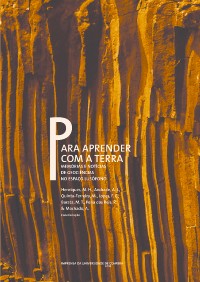Please use this identifier to cite or link to this item:
https://hdl.handle.net/10316.2/31357| DC Field | Value | Language |
|---|---|---|
| dc.contributor.author | Dias, G. M. | |
| dc.contributor.author | Henriques, M. H. | |
| dc.date.accessioned | 2014-06-19T11:35:40Z | |
| dc.date.accessioned | 2020-09-18T16:45:37Z | - |
| dc.date.available | 2014-06-19T11:35:40Z | |
| dc.date.available | 2020-09-18T16:45:37Z | - |
| dc.date.issued | 2012 | - |
| dc.identifier.isbn | 978-989-26-0533-3 (PDF) | |
| dc.identifier.uri | https://hdl.handle.net/10316.2/31357 | - |
| dc.description.abstract | The present work refers to a research in science education, focused on practical activities in the field, which sought to respond to the following problem: “How to encourage meaningful and relevant learning, about detritic rocks, particularly clays?” To this end, an educational intervention involving 25 students of the 11th year of a secondary school located in the municipality of Arganil (Portugal) was conceived, planned, implemented and assessed, under the frame of the “Theme IV – Geology, problems and materials of everyday life”, included in the subject “Clay Rocks” of Biology and Geology. The intervention included several activities in small groups, which were developed in two distinct contexts – in the classroom and/or laboratory and in the field. The practical field work was focused on a visit to the Carriça Ceramic Company, headquartered in Coja, at the municipality of Arganil (Portugal). To evaluate the perceptions of students about practical field work, two evaluation instruments were designed, developed and validated – the Diagnostic Questionnaire and the Assessment Questionnaire, which were administered before and after the intervention, respectively –, as well as two record instruments – a Grid of Observation and the Teacher´s Diary. The results obtained from this study provide positive indicators in relation to the educational value of interventions that promote interactions between formal and non‑formal contexts and focused on the everyday life of pupils, and reinforces the idea of taking the fieldwork as an important strategy in promoting science education in general and geology in particular, for purposes of Education for Sustainable Development. | eng |
| dc.description.abstract | O presente trabalho refere‑se a uma investigação em Educação Científica, centrada em atividades práticas de campo, que pretendeu dar resposta ao seguinte problema: “Como estimular aprendizagens significativas e relevantes, acerca de rochas sedimentares detríticas, nomeadamente de argilas?”. Para tal, concebeu‑se, planeou‑se, implementou‑se e avaliou‑se uma intervenção educativa que envolveu 25 alunos do 11º ano de escolaridade, da escola do Ensino Secundário do concelho de Arganil (Portugal), enquadrada na temática “Rochas Argilosas” do “Tema IV – Geologia, problemas e materiais do quotidiano”, da disciplina de Biologia e Geologia. A intervenção incluiu a realização de atividades, em pequenos grupos, em dois contextos distintos – na sala de aula e/ou laboratório e no campo. O trabalho prático de campo centrou‑se numa visita à Empresa Cerâmica da Carriça, com sede em Coja, concelho de Arganil (Portugal). Para avaliar as perceções dos alunos acerca de trabalho prático de campo, foram concebidos, elaborados e validados dois instrumentos de avaliação – Questionário de Diagnóstico e Questionário de Avaliação, administrados antes e depois da intervenção, respetivamente – e instrumentos de registo – Grelha de Observação e Diário do Professor. Os resultados obtidos com este estudo oferecem indicadores positivos em relação ao valor educativo de intervenções que promovam interações entre contextos formais e não formais e centradas no quotidiano dos alunos, e permitem reforçar a ideia de se assumir o trabalho de campo como uma estratégia importante na promoção de Educação Científica em geral, e da Geologia em particular, com propósitos de Educação para Desenvolvimento Sustentável. | por |
| dc.language.iso | por | - |
| dc.publisher | Imprensa da Universidade de Coimbra | por |
| dc.relation.ispartof | http://hdl.handle.net/10316.2/24405 | por |
| dc.rights | open access | - |
| dc.subject | Education for Sustainable Development | eng |
| dc.subject | Science Education | eng |
| dc.subject | Secondary Education | eng |
| dc.subject | Geology | eng |
| dc.subject | Field work | eng |
| dc.subject | Educação para Desenvolvimento Sustentável | por |
| dc.subject | Educação Científica | por |
| dc.subject | Ensino Secundário | por |
| dc.subject | Geologia | por |
| dc.subject | Trabalho de campo | por |
| dc.title | Perceções de alunos do ensino secundário de Arganil (Portugal) acerca de trabalho de campo | por |
| dc.title.alternative | Perceptions of students of secondary education from Arganil (Portugal) about field work | eng |
| dc.type | bookPart | por |
| uc.publication.firstPage | 95 | - |
| uc.publication.lastPage | 104 | - |
| uc.publication.location | Coimbra | por |
| dc.identifier.doi | 10.14195/978-989-26-0533-3_9 | - |
| uc.publication.digCollection | PB | por |
| uc.publication.orderno | 9 | - |
| uc.publication.area | Ciências Naturais | por |
| uc.publication.bookTitle | Para aprender com a Terra: memórias e notícias de Geociências no espaço lusófono | - |
| uc.publication.manifest | https://dl.uc.pt/json/iiif/10316.2/31357/218765/manifest?manifest=/json/iiif/10316.2/31357/218765/manifest | - |
| uc.publication.thumbnail | https://dl.uc.pt/retrieve/11296570 | - |
| uc.publication.parentItemId | 52123 | - |
| uc.itemId | 71898 | - |
| item.grantfulltext | open | - |
| item.fulltext | With Fulltext | - |
| Appears in Collections: | Para aprender com a Terra: memórias e notícias de Geociências no espaço lusófono | |
Files in This Item:
| File | Description | Size | Format | |
|---|---|---|---|---|
| 9-para_aprender_com_a_terra_v.f..pdf | 1.03 MB | Adobe PDF |  |
Items in DSpace are protected by copyright, with all rights reserved, unless otherwise indicated.
